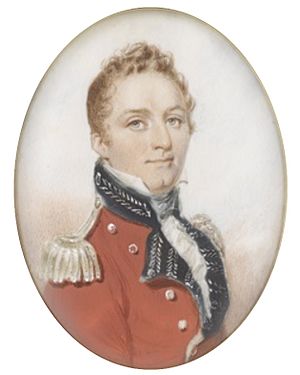Robert Lawrence Dundas facts for kids
Quick facts for kids
Sir Robert Dundas
|
|
|---|---|
 |
|
| Birth name | Robert Lawrence Dundas |
| Born | 27 July 1780 Middlesex, England |
| Died | 23 November 1844 (aged 64) Loftus, Yorkshire, England |
| Allegiance | |
| Service/ |
|
| Years of service | 1797–1844 |
| Rank | Lieutenant-General |
| Battles/wars | Anglo-Russian invasion of Holland Peninsular War |
| Awards | Army Gold Cross Knight of the Order of the Tower and Sword Knight Commander of the Order of the Bath |
| Relations | Thomas, 1st Lord Dundas (father) Lawrence, 1st Earl of Zetland (brother) Charles Lawrence Dundas (brother) G. H. L. Dundas (brother) |
Lieutenant-General Sir Robert Lawrence Dundas was an important British military leader. He was also a Whig politician. He served in the House of Commons, which is part of the British Parliament. He represented different areas like Malton, East Retford, and Richmond at various times between 1807 and 1841. He was born on July 27, 1780, and passed away on November 23, 1844, at the age of 64.
Contents
Early Life and Family Background
Robert Lawrence Dundas was born in Middlesex, England. He was the seventh son of Thomas Dundas and Lady Charlotte Fitzwilliam. His grandfathers were Sir Lawrence Dundas, 1st Baronet and William Fitzwilliam, 3rd Earl Fitzwilliam.
In 1781, his father became a baronet, which is a special title. Later, in 1794, his father was given the title of Baron Dundas. Robert had several older brothers, including Lawrence Dundas, 1st Earl of Zetland and George Heneage Lawrence Dundas, who became a Rear Admiral.
Military Career and Achievements
Robert Dundas joined the British Army on December 1, 1797. He started as a second lieutenant.
Early Military Service
He first served as an engineer officer during the Anglo-Russian invasion of Holland. In 1800, he became a lieutenant. The next year, he went to Egypt to fight against the French army. He was part of the Battle of Alexandria. He was promoted to captain in 1802 and major in 1804. In 1805, he served in northern Germany with the Royal Staff Corps.
Fighting in the Peninsular War
Dundas played a big part in the Peninsular War. This was a major conflict in Europe. He fought in many important battles, including:
- Talavera (1809)
- Buçaco (1810)
- Fuentes de Oñoro (1811)
- Salamanca (1812)
- Vitoria (1813)
- the Pyrenees (1813)
- the Nivelle (1813)
- the Nive (1813)
- Toulouse (1814)
Awards and Promotions
For his bravery and service in the Peninsular War, Robert Dundas received several honors. He was given the Army Gold Medal with a Gold Cross and three clasps. In 1814, he was made a Knight of the Portuguese Order of the Tower and Sword. The next year, in 1815, he became a Knight Commander of the Order of the Bath (KCB).
He continued to rise through the ranks in the army:
- Lieutenant-Colonel in 1811
- Colonel in 1821
- Major-General in 1830
- Lieutenant-General in 1841
In June 1840, he was also made the colonel of the 59th (2nd Nottinghamshire) Regiment of Foot.
Personal Life and Passing
Sir Robert Lawrence Dundas never married. He passed away at his home, Loftus Hall, in Yorkshire. He was 64 years old.
 | Ernest Everett Just |
 | Mary Jackson |
 | Emmett Chappelle |
 | Marie Maynard Daly |

